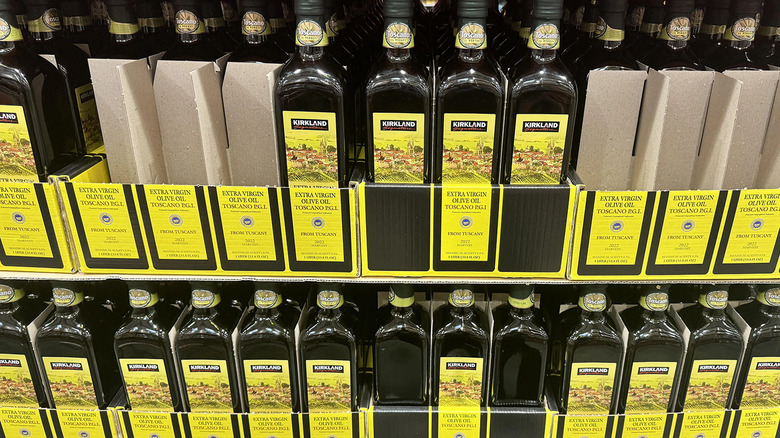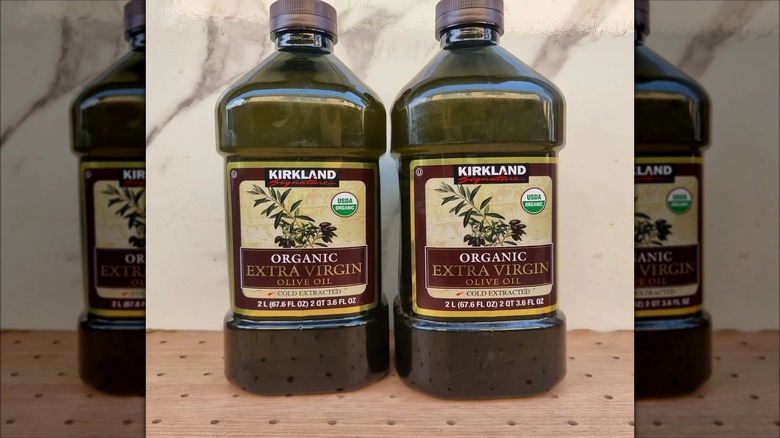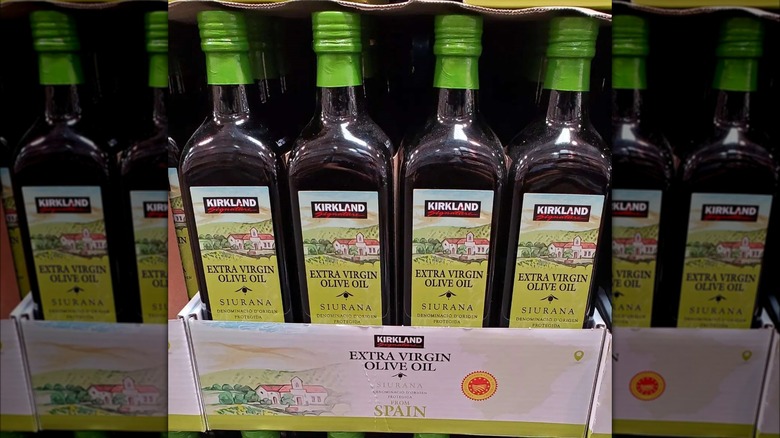Why Costco's Certified Extra Virgin Olive Oil Is A Big Deal
These days, finding a good olive oil feels like searching for a needle in a haystack. Stroll down the cooking oil aisle, and you're bombarded with an array of bottles, each claiming to be the finest "organic extra-virgin olive oil" you can buy. But the rub is that snagging a bottle of genuine, top-quality extra-virgin olive oil (EVOO) is trickier than it seems.
What sets extra-virgin apart from regular olive oil is its purity. It's free from chemical treatments, thus giving a rich flavor that you won't get with a regular bottle. EVOO also has a low level of oleic acid (less than 0.3%), which is a marker that it's made from healthy olives. Despite its superior quality, EVOO is surprisingly easy to find, which is more concerning than reassuring. The market is awash with impostors, as numerous brands resort to clever marketing to mask mediocre oils as premium. In fact, a 2022 European Commission report highlighted olive oil as a food that is often mislabeled.
That's why Costco's entry into the olive oil market is such a breath of fresh air. Its Kirkland Signature olive oils are certified, so when you see the bottle, all you need to do is grab it and go while being totally at ease, knowing that what you're getting is 100% the real deal.
Costco's olive oil is certified by the Bureau Veritas
When you're buying extra-virgin olive oil in general, a little label reading goes a long way. Specifically, you should pay special attention to certifications from reputable organizations printed on the label. For instance, Costco's EVOO, under the Kirkland brand, is verified by Bureau Veritas. This agency specializes in testing, inspecting, and certifying products. The agency will thoroughly test the olive oil sold by Costco and act as a trusted third party on behalf of the consumers, ensuring that it meets all requirements for being called extra-virgin.
One key standard for EVOO, as outlined by the USDA, is that it must possess "excellent flavor and odor." This means that despite Costco's more affordable pricing, its olive oil doesn't skimp on quality. In fact, Deborah Krasner, in her book "The Flavors of Olive Oil," advises against using price as the sole measure of quality. Instead, she suggests checking the oil's production date when buying olive oil. The more recent it is, the fresher and more flavorful the oil will be.
Costco's extra-virgin versus name-brands
If you haven't checked out Costco's Kirkland Signature oil yet, you can get a 2-liter bottle for $21.99, which works out to about $11 per liter. In contrast, for the same price, you'd only be able to get around a liter of oil from name brands like Graza, which sells EVOO Sizzle at a price point of $16 for a 750-milliliter bottle. It's easy to see why even high-profile chefs like Samin Nosrat rave about Costco's olive oil: It simply offers great value for the price.
While it may not rival the taste of the most premium oils on the market, given it's a budget-friendly option from a bulk retailer, the quality is still noteworthy. You're getting authentic extra-virgin olive oil at a fraction of the cost, which is particularly appealing if you've previously settled for lower-quality, unbranded options that often fall short.
However, it's important to remember that the specific type of olive oil (be it Italian, Spanish, or Organic EVOO) available in the one-liter bottles at Costco might vary throughout the year. This is due to fluctuations in supply, as noted by Justin Knapp, a sourcing manager for Costco's olive oil division, in an interview with America's Test Kitchen. Despite these variations, you can rest assured that each type is authentic, backed by PDO (Protected Designation of Origin) and PGI (Protected Geographical Indication) certifications. Not bad for price-club olive oil, hey?


